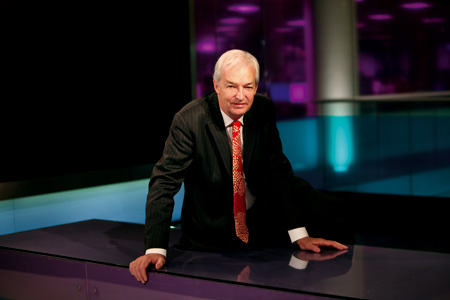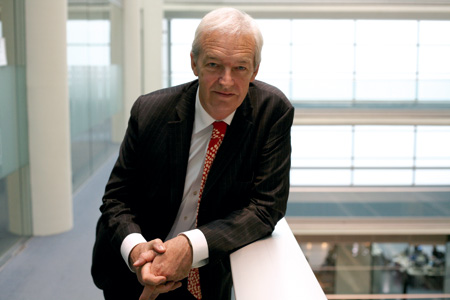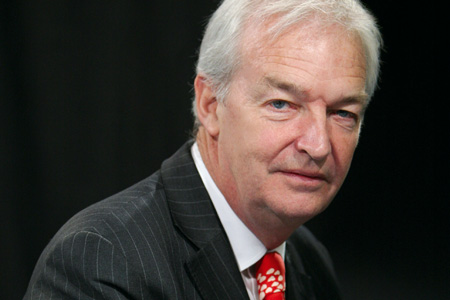
Jon Snow
Issue 50 November 2008
Jon Snow, the Channel 4 anchor man has developed something of a cult following due to a leaning more radical than his ties. He speaks candidly with Hyder Abassi of alternative views rising from almost forty years of journalism.
For many viewers, it might be easy to see Jon Snow as merely an anchor for Channel 4 News, sitting comfortably in a slick studio and reading from an autocue. But this would be a mistake. Jon Snow is a veteran reporter, covering some of the pivotal events of the last 30 years, from the Iran- Iraq war, to the fall of the Berlin Wall; from the Falklands invasion to South Africa’s first ever democratic elections. On the way, he’s managed to interview world-renowned figures as diverse as Pope John Paul II, Nelson Mandela and former US president Ronald Reagan.

Waiting in the lobby of the ITN studios where Channel 4 News is produced, it’s not long before the unmistakeably towering figure walks through the revolving doors in one of his trademark outlandish ties. I feel that I know Jon Snow intimately, having recently read his impassioned autobiography, Shooting History. In it, he recounts key experiences in his life: his first major interview with the Ugandan tyrant Idi Amin; growing up in post-war rural Sussex, and being denounced by the Queen over a report on Princess Diana’s funeral.
Snow unabashedly reveals his antiestablishment views throughout and, as a witness to US-led interventions, from El Salvador to Iraq, is highly critical of US foreign policy. With this in mind, I ask if he’s ever worried about how people view his politics. “I suppose if I were particularly party political then I would worry about how people view my politics, but I think hopefully what I am is committed and engaged, rather than partisan. Obviously I’m offended by injustice and inhumanity. But I don’t really see that as politics.”
With the BBC dominating broadcast journalism for such a long time in Britain, I ask Jon how Channel 4 News provided an alternative to the state-owned corporation. “Channel 4’s remit is to be other – not to be the BBC. It was set up to provide opportunities for minorities. But in that regard, I don’t think we’re doing enough. I think we could be reaching out to minority communities more than we do. With the best will in the world, we have a multicultural and multiracial workforce, but not in the right proportions to match the proportions of the population and therefore inevitably, the editorial decisions are very mainstream.”
Being alternative and a voice for minorities is congruous with Jon Snow’s career from the outset. Even before journalism, he worked as director at the New Horizon Youth Centre, a drop-in centre for homeless teenagers in London’s Soho. And although his was a typically middle-class upbringing, his academic life unusually wasn’t: he failed whilst at school and barely received entry into Liverpool University to study Law, leaving without a degree. This followed a well-publicised sit-in protest against the South African apartheid.
The media all over the world is attacked for being biased and partial towards certain issues, politics or groups. The Israel- Palestine conflict is a good case in point, where the BBC for example, is readily accused by both sides, of being prejudiced and insensitive. Just as I’m about to ask the inevitable, Jon interrupts, “Neutral is not a human condition”, he says emphatically. “I don’t even think that impartiality is a human experience. Everyone is partial. I mean, your experience, as a young Muslim, is extremely different from someone who grew up in a Christian, Tory, upper-middle class household. Therefore where is the neutrality between us? One has to be fair and open to other views than one’s own. I certainly don’t have any desire to be neutral. The day I become neutral is the day I die.”

Unbeknownst to many, Jon’s career started out in radio, with the first commercial radio station in Britain, the London Broadcasting Company, in 1973. Using “clunky Motorola radios”, Jon would ride around London on his bicycle, sometimes broadcasting whilst he pedalled. With the latest technology used today to broadcast reports, I ask him what impact this has on the quality of journalism. “I think the problem is that technology allows us to have the information now. If you’re going to have it now, you’re not going to have the time to think it through and work on it and get a bit deeper. Very possibly, you’re going to get the perspective of 15 cameras, firing shots of various elements of a report. This destroys the idea of a pair of single eyes, of a journalist who is a witness to an event, or an issue. In the old days and even sometimes now, I used to do the whole story with one cameraman. I used to say, ‘No, I won’t take that picture because I didn’t see it. I want to show you what I saw’. When I go to Iraq, I just like to get one small insight, so that we can shoot with one camera. Then the editor rings and says, ‘But have you seen the shot of the woman and her baby crying, you must put that in’. There’s a terrible desire, not only to have everything now, but to have everything in the piece. Everything the BBC might have or everything the Americans have got.”
Jon also spent time as the Washington correspondent for ITN in the mid-1980s and experienced the differences in journalism across the Pond. This leads me onto American journalists and the Iraq war. I ask Jon if he believes that British journalists were more scrutinising of their American counterparts, in questioning the reasons for going to war. “I’m not sure we questioned Blair enough about why we were going to war. I think to some extent, the media was complicit worldwide. American journalists are much more respectful of their politicians. They’re not as rough with them as we are and I think that has a lot to do with being American. And if you’re in the American media, you’re being American. Whereas over here, we’re a lot more detached.”
In the chapter heading “Of Oil, Islam and Moscow” of his book Shooting History, Jon writes: “To be on the Iran-Iraq battlefront back in 1981 was to be in the very heart of hell”. Reporting on the Iran-Iraq war in the early 1980s, the Gulf war of 1991 and the most recent invasion, I ask Jon how he would compare the country and its people to these previous visits. “During the Iran-Iraq war, both Iran and Iraq were in a pretty bad state economically. But fundamentally, people did not lie in their homes and fear that people were going to get them. I would say that life in Iraq now is worse than any time in my lifetime. The society has been decapitated. Basically, all the professional middle-class strands of society have left. They’re either at large, in Iraq, two and a half million of them, or they’re in Syria or Jordan. They are the key drivers of this society. The ones that are left are of a more feudal order; tribal chiefs and elders, who don’t have time for intellectuals, because they fear them. They fear that they’ll be challenged by them. And that’s why they get killed and that’s why they leave the country. So there’s been a kind of ethnic cleansing of leadership.”
With groups like Al-Qaeda in Iraq, the rise of Moqtadr al Sadr’s Mahdi army and reports that women are being killed for not covering, analysts have argued that the country is turning into an extreme Islamist state. “I don’t think it’s turning into anything”, insists Jon. “It’s a continuing shambles, where all sides are using force to stake out territory, possession, resources and oil. I think very understandably; when people are under pressure and in need, they very often turn to faith. To that extent, the grimmer it becomes, the more needy people become of faith. But I don’t think it’s edging towards an Islamic state.”
Closer to home, Snow presented a documentary called What Muslims Want in 2006, where an extensive survey was commissioned of the views and beliefs of Muslim Britons. Some of the results found that one in four Muslims believed the July 7th bombings were justified, in light of the government’s support of the ‘War on Terror’. I was curious to know if he was surprised by any of the results. “No, I wasn’t surprised at all. When you consider two-thirds of Americans think Saddam Hussein had something to do with the blowing up of the twin towers, who are we to criticise Muslims for thinking that conceivably, someone else was behind it? We all look at 9/11 and think, gosh, this was an extraordinarily efficient job. Who else could have been behind it? I believe Muslims think that the most because it’s had terrible consequences for their community.”
Pointedly, in What Muslims Want, Jon speaks to ordinary Muslims on the streets: housewives, young students and taxi drivers. But he doesn’t consult journalists, pressure- groups or academics. “I did that deliberately”, he says candidly. “The people you don’t hear from are the ordinary people on the streets. I went up to Bradford to talk to a group of sixth-formers, who all turned out to be Muslims and they were people who never got visited by somebody like me. And yet what we talked about was very much in the view of any other sixth-form. Of course there were Muslim issues that they wanted to pursue, but I feel that there’s not a great deal of reaching out or interest in trying to find out, what Muslims think.”
In March this year, Spectator magazine adorned its cover with a caricature of Osama bin Laden, with the heading “How to spot the Jihadi next door”. What does Jon think of the media’s role in creating community cohesion? “The media has branded Muslims in a commercial sense. I think the way things have been reported has made the Muslim community a more suspect community. That must be very difficult. People must get over that, before they get on with their lives. Of course, most people who intersect with Muslims in their daily lives are not affected by that. It’s a bit like Barack Obama talking about his mother and how she feared black people: it’s completely irrational and the media does quite a lot to add to it. When a story breaks, the first finger is pointed and then you discover it actually has nothing to do with the Muslim community at all.”
Where particular commentators or newspapers have argued that Muslim principles are incongruous with British values, I’m intrigued to find out how Jon would define British values. “Drink, football, womanising, paganism. It’s a pretty squalid business”, he says with a visible look of pessimism. “That’s why I think multiculturalism has brought so much more balance into Britain.” We go on to talk about the disintegration of community in Britain today and whether non- Muslim Britons could learn anything from Islamic values. Jon admits that there’s a degree of envy of the Muslim family structure and the idea of the extended family. “I’ve just read a book by a very good former BBC journalist, called Yasmin Hai, who writes about growing up in Wembley. Her father was a first-generation Pakistani and he was desperate that his children should become English. It’s an extraordinary voyage of trying to become English and at the same time, learning about Muslims values. What you do spot, as this girl grows up, is the cohesion. When her father dies, when Yasmin is 17, the house is absolutely filled with people, to help, to grieve, to be part of the process. We have no process for dying in the British traditional system. We used to have a Christian tradition and I’m not arguing that we should have that, but a familial tradition is important.”
Although clearly respectful and appreciative of religion, Jon rejects my proposal that it can be a remedy to the social malaise in Britain today. “I still think, rather than religion, the issue is about the isolation of the individual. That could be through the obliteration through drink; it could be through absorption with the internet and iPods. There are dangers, but I don’t think it’s about religion. No I think it’s more about the fact that technology is ruling our lives and we’re addicted. It’s taking us to very unpleasant places: the vast spread of pornography and the abuse of women on the internet is very frightening. I would be sorry if the only solution was religion. I think the main solution would be to talk to each other.”
There’s a slight look of weariness on Jon’s face, which is hardly surprising since we’ve touched on some particularly dense subjects. So I relieve his fatigue and conclude the interview. At 61, Jon Snow is one of the oldest senior broadcasters in the industry. Despite his age, according to a recent feature in the Independent on Sunday, Jon is a “cult figure” amongst younger viewers. But it’s easy to see why. He’s involved in many campaigns involving younger people, the most recent being the Disarming Britain season, launched by Channel 4, to analyse knife crime. It’s a true measure of character that Jon is able to engage in high-brow political debates but also connect with a range of different people of differing backgrounds and ages. As we shake hands to bid each other goodbye, my eye falls for a final glance on his buccaneer tie, a rebellious nod from a man who defies the grey norm, and embraces a colourful future that would make Britain great.
Portraits Rehan Jamil
Bookmark this |
|
Add to DIGG |
|
Add to del.icio.us |
|
Stumble this |
|
Share on Facebook |
|
Share this |
|
Send to a Friend |
|
Link to this |
|
Printer Friendly |
|
Print in plain text |
|

Comments
0 Comments